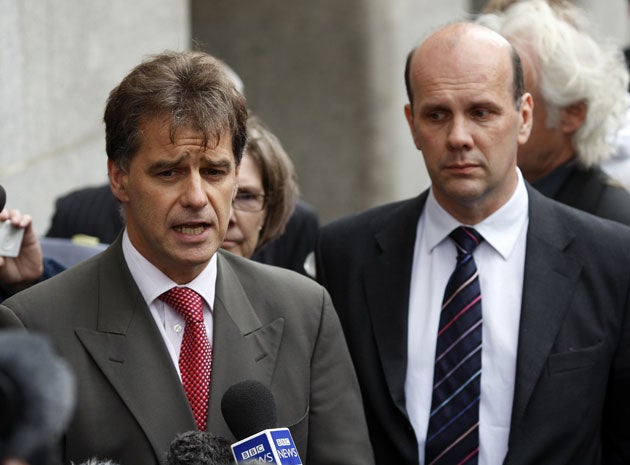Back to square one for police after their 'soft target' is freed

The end of Barry George's eight-year imprisonment yesterday left unsolved the murder of Jill Dando outside her home, one of the most high-profile cases in recent crime.
Soon after the murder, police had built a clear picture of the events of 26 April 1999, when the popular television presenter was shot outside her front door in Gowan Avenue, Fulham, west London. They soon knew she had left the home of her fiancé in Chiswick earlier, then drove home, stopping to shop in Hammersmith. They knew, too, that she bought fish and chips on the way.
They even knew it would have taken her 10 seconds to walk from her car to her front door, and that the killer would have had to act quickly. Yet despite their detailed knowledge, and the discovery of a cartridge-case suspected to be from a 9mm Walther PPK or a Beretta, the identity of the gunman evaded them.
A year later, despite eliminating 400 men as potential suspects, the police had still not found the killer. The officer in charge of the investigation, Detective Chief Inspector Hamish Campbell, suspected that a man with an obsessive personality was responsible.
Then, nearly 13 months after the murder, on 15 May 2000, police arrested Barry George, a 40-year-old local man with a long history of stalking blonde women, sexually motivated attacks and an obsession with guns.
Though his chaotic private life and odd behaviour created vast amounts of circumstantial evidence, the case against him was heavily reliant on a single piece of forensic evidence, a microscopic speck of gunshot residue in his pocket. It was enough to convict him as Ms Dando's killer at the Old Bailey in 2001, though one of the 11 jurors disagreed.
During Mr George's second appeal, in November 2007, his defence team showed that there was nothing to link the tiny speck of residue with a murder weapon. Nor was there any proof Mr George had fired it. Eight months later, he walked free.
The overturning of Mr George's conviction leaves police with uncomfortable questions, including the failure to find the murder weapon and how an investigation given massive resources failed. But chief among the concerns raised by yesterday's decision will be that, after failing to track the killer, police simply rounded up a soft target, a local man known for erratic behaviour. Now theories that abounded at the time of Ms Dando's death may resurface. The single head-shot led many to suspect a professional hitman, perhaps due to her work with the BBC's Crimewatch.
Others thought her charity appeal for the people of Kosovo may have made her a target for a Serbian gang, acting in revenge at Nato air strikes on Serbia. Reports at the time said Ms Dando had received a critical letter from a Serbian just two weeks before she was murdered. A third theory had it that she had simply been the unlucky victim of a bungled robbery.